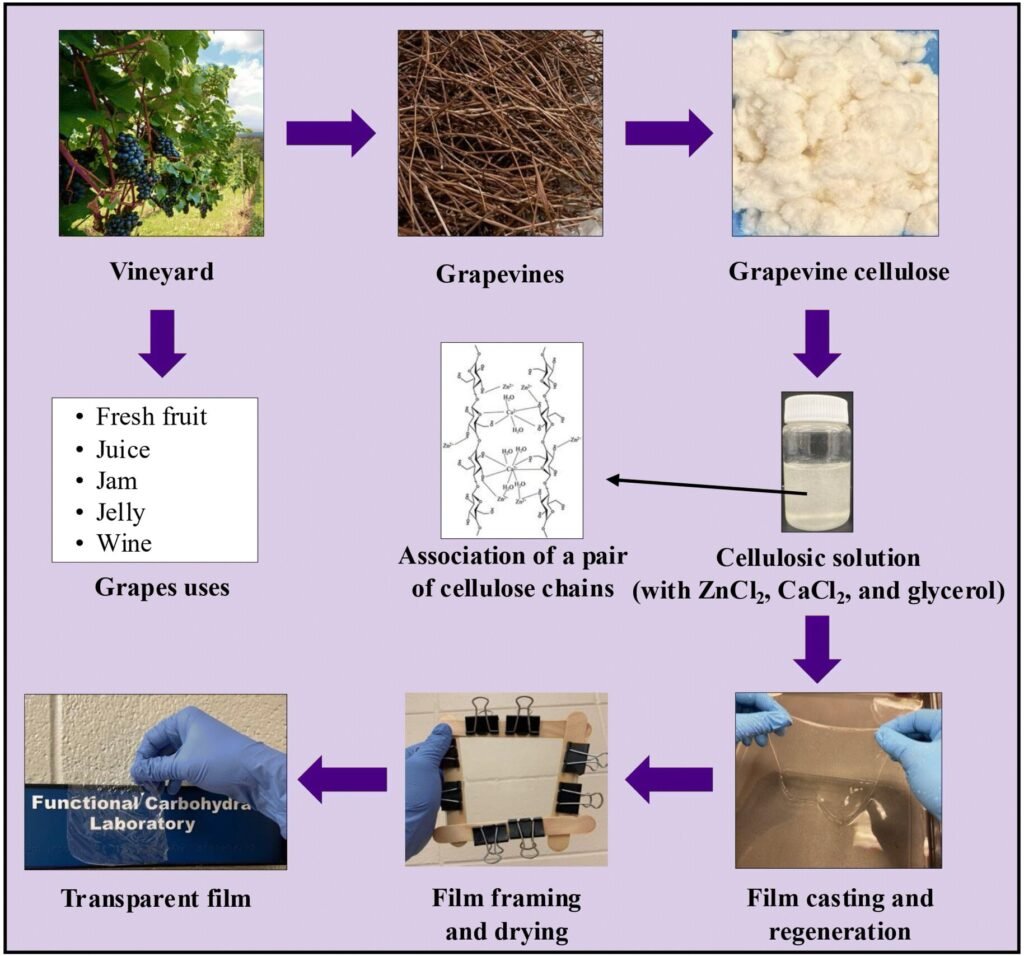
A new study from South Dakota State University reveals how grapevine canes can be converted into plastic-like material that is stronger than traditional plastic and will decompose in the environment in a relatively short amount of time.
The need for biodegradable packaging materials has never been higher. Currently, most packaging is “single use” and is made with plastic materials derived from nonrenewable sources like crude oil that take hundreds of years to decompose in the environment.
On top of this, only 9% of plastic is recycled. This has resulted in the formation of floating piles of plastic garbage in the ocean, called the “Great Pacific Garbage Patch.”
But maybe even more concerning is the discovery of micro- and nano-plastics in the environment. Research has found that plastic breaks down into tiny particles, which are ingested or inhaled by both humans and animals, and are found literally everywhere, including in the human body—according to recent research studies. Worse, little is known about the long-term health effects of microplastics.
Srinivas Janaswamy is an associate professor in South Dakota State University’s Department of Dairy and Food Science. His research has focused on developing value-added products through biowaste and agricultural byproducts. One of the overarching goals of Janaswamy’s research is to tackle the plastic waste crisis.
Perhaps the biggest contributor to plastic waste, at least in the United States, is plastic bags, the kind found at most retail stores. These bags, while sometimes recycled, are often only used once and can be found littered throughout the environment.
To address this problem, Janaswamy is working toward developing a plastic-like bag that will decompose in the environment.
“That is my dream,” Janaswamy said.
The key ingredient to Janaswamy’s work? Cellulose. This biopolymer is the most abundant organic substance on Earth and is found, primarily, in the cell walls of plants. Cellulose, thanks to strong hydrogen bonds and a chain of glucose molecules, gives plants structural strength and rigidity along with other biopolymers such as mannan, xylose, hemicellulose and lignin.
Humans have long used cellulose to create products. Cotton, the material used to make a majority of the world’s clothing, is primarily composed of cellulose. Wood is rich in cellulose as well.
In previous research, Janaswamy has extracted cellulose from agricultural products like avocado peels, soyhulls, alfalfa, switchgrass, spent coffee grounds, corncob and banana peels. He uses the extracted cellulose to develop films—materials that look and feel similar to traditional plastic wrapping.
“By extracting cellulose from agricultural products, value-added products can be created,” Janaswamy said.
Each of Janaswamy’s films has different characteristics and properties. Some are more transparent than others. Some are stronger. But thanks to a unique collaboration with a fellow SDSU faculty member, Janaswamy may have created his best value-added product yet.
Grapevine canes
Janaswamy had just finished presenting “Ag Biomass—A Holy Grail to Clean up the Plastic Mess” at SDSU’s Celebration of Faculty Excellence when he was approached by Anne Fennell, a Distinguished Professor in the Department of Agronomy, Horticulture and Plant Science.
After listening to Janaswamy’s presentation, Fennell became interested in the research and had an idea. A leading researcher in the study of grapevines, she knew that grapevine canes—the woody plant material that grapes grow on—were rich in cellulose. She also knew that grapevine canes were abundant and had limited use after harvest.
“Every year we prune the majority of yearly biomass off the vine,” Fennell said. “The pruned canes are either mowed over, composted and reapplied to the soil, or burned in some areas. Research in Australia showed that prunings could be removed from the field in alternate years without affecting soil health.
“My thought was why not use this for value added films. Several of the materials that Janaswamy previously used had a high-water content, in contrast the winter pruning yields a cellulose-dense material with low water content, making them an abundant ideal material to work with.”
Fennell’s idea led to a collaboration, and soon Janaswamy was extracting cellulose—which looks almost like cotton—from the canes of grapevines. The resulting films were eye-opening.
According to their recent study published in Sustainable Food Technology, Janaswamy’s grapevine cane films are transparent and strong and biodegrade within 17 days in the soil—leaving behind no harmful residue.
“High transmittance in packaging films enhances product visibility, making them more attractive to consumers and facilitating easy quality inspection without the need for unsealing,” Janaswamy said. “These films demonstrate outstanding potential for food packaging applications.”
The grapevine canes were harvested from SDSU’s research vineyard. The research team, which includes doctoral candidates Sandeep Paudel and Sumi Regmi, and Sajal Bhattarai, an SDSU graduate and a doctoral candidate at Purdue University, followed a published protocol in developing the films, which includes drying and grinding the canes and extracting the cellulosic residue. The residue was then solubilized and cast onto glass plates to create the films.
Testing revealed the grapevine cane-derived films were actually stronger than traditional plastic bags—in terms of tensile strength.
“Using underutilized grapevine prunings as a cellulose source for packaging films enhances waste management in the field and addresses the global issue of plastic pollution,” Janaswamy said. “Developing eco-friendly films from grapevine cellulose represents a practical approach to sustainability, helping to conserve the environment and its resources and contributing to the circular bioeconomy.”
The results of this work move Janaswamy one step closer to his dream of developing a bag made from a plastic-like material that will quickly decompose in the environment.
More information:
Sandeep Paudel et al, Valorization of grapevine agricultural waste into transparent and high-strength biodegradable films for sustainable packaging, Sustainable Food Technology (2025). DOI: 10.1039/D5FB00211G
Provided by
South Dakota State University
Citation:
Grapevines can be converted from agricultural waste to biodegradable films for sustainable packaging (2025, August 5)
retrieved 5 August 2025
from https://phys.org/news/2025-08-grapevines-agricultural-biodegradable-sustainable-packaging.html
This document is subject to copyright. Apart from any fair dealing for the purpose of private study or research, no
part may be reproduced without the written permission. The content is provided for information purposes only.

